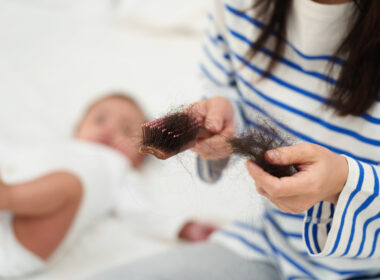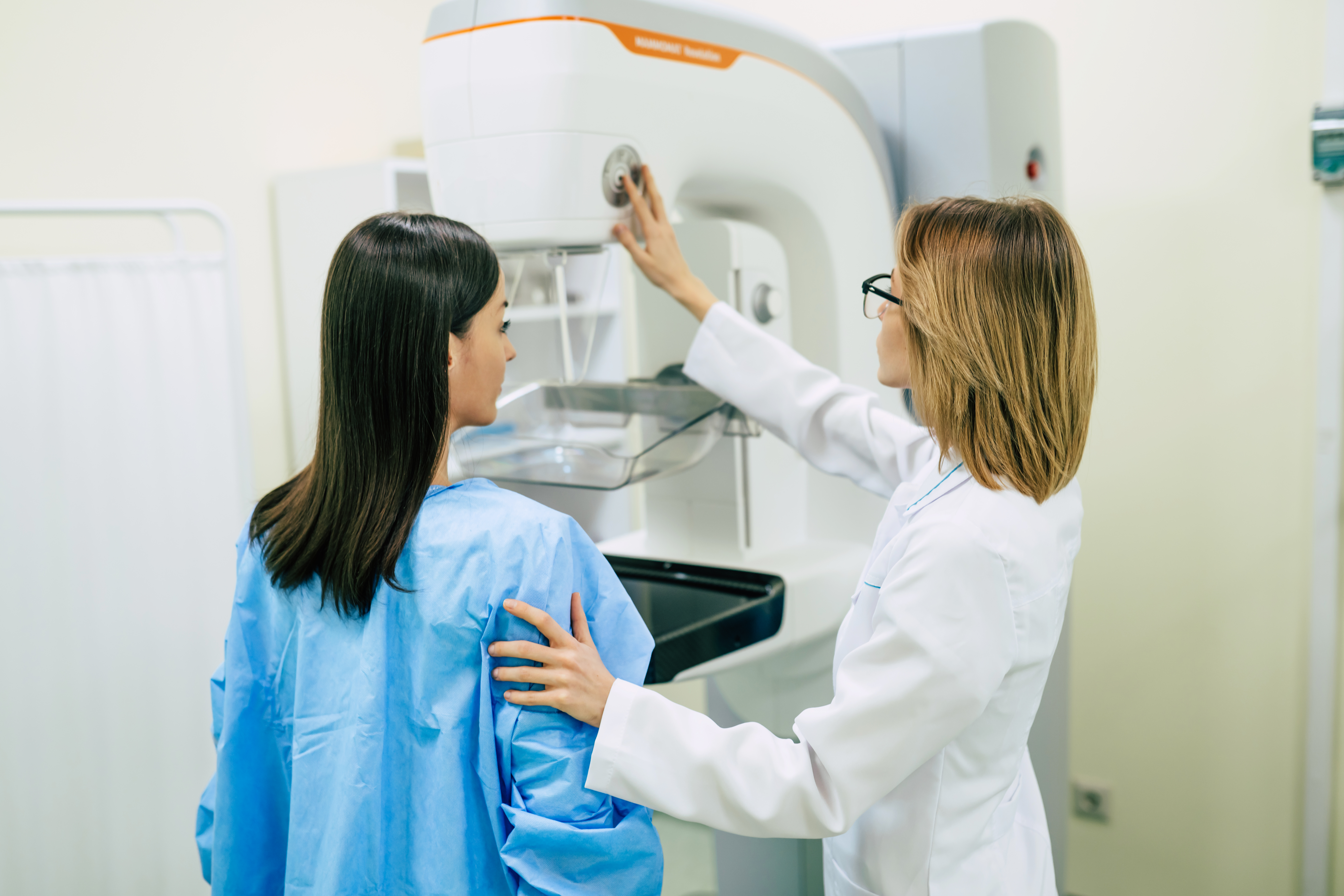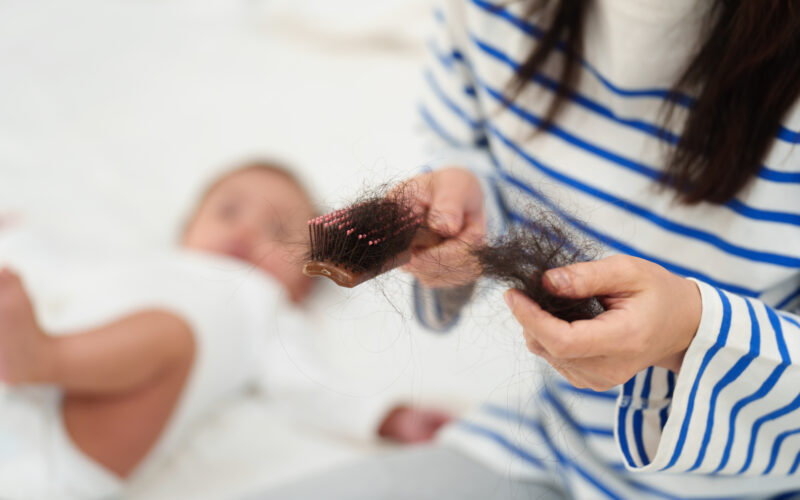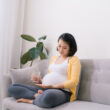One of the many things new moms are often unprepared for after having a baby is the host of postpartum idiosyncrasies and complications. From gigantic hospital underwear (IYKYK) to leaky breasts or clogged milk ducts, from using perinatal bottles every bathroom trip to the abundance of sleepless nights, new motherhood brings not only joy, but also profound (and difficult!) challenges. One challenge that takes many women by surprise is postpartum hair loss (known clinically as telogen effluvium).
Does everyone experience postpartum hair loss?
It is estimated that about half of new mothers experience postpartum hair loss, but that number could be higher. In one 2023 study publicado en el International Journal of Women’s Dermatology, about 90% of participants responded that they experienced postpartum hair loss. In particular, long-term breastfeeding (when compared to breastfeeding for 6 months or less) was correlated with postpartum hair loss [1]. Interestingly, however, according to Johns Hopkins Medicine, adoptive mothers, women undergoing fertility treatments, and women who have had miscarriages can experience hair loss as well.
Why does hair loss occur postpartum?
Hormones and breastfeeding
During pregnancy, high levels of hormones are at play. This is especially true when it comes to estrógeno, which (among many other important things!) contributes to hair growth. The sharp hormonal drop that occurs after birth (and the natural, increased production of the hormone prolactina, particularly if a mother is breastfeeding) can cause loss and thinning of the mother’s hair.
Lack of good nutrition and selfcare
The discontinued use of prenatal vitamins and the added stresses of taking care of a newborn could also contribute to hair loss. Prenatal vitamins are powerhouses for hair growth, and although some women continue to take them after birth, many (like me) either think they don’t need those vitamins anymore or get so focused on newborn care that they neglect this small, but incredibly important part of self-care.
Estrés
Many women (whether or not they have given birth) have likewise experienced the effect of stress on their skin as well as their hair, so it makes sense that postpartum hair loss could be exacerbated by the natural struggles that come with being a new mom. The 2023 study mentioned above also suggests that another contributing factor to postpartum hair loss could be preterm birth, which brings a whole host of stresses along with it [1].
What does postpartum hair loss look like, and how long does it last?
Postpartum hair loss is a spectrum, but it usually starts a few months after giving birth, and typically ends around the 6-month postpartum mark. Some women may not notice much of a difference between their typical pre-baby hair shedding and postpartum hair shedding. Some women (like myself) may have an uptick in hairs found on their comb or brush after detangling hair in the shower. Others, like one woman I spoke to, may lose hair all along their hairline, and still others may have whole handfuls or patches of hair come out of their scalp with brushing or running their fingers through their hair.
Thankfully, postpartum hair loss doesn’t last forever, and you’ll begin to regrow hair you’ve lost soon thereafter. Like many other things in the newborn stage, postpartum hair loss is just for a season, and according to the Cleveland Clinic, most women see things resolve around the time that their baby turns one year old (or sooner!).
Thankfully, postpartum hair loss doesn’t last forever, and you’ll begin to regrow hair you’ve lost soon thereafter.
Can anything be done about postpartum hair loss?
The bad news is that postpartum hair loss does not seem to be preventable. Recent products, like éste are attempting to take on this challenge by utilizing an approach targeted specifically for postpartum hair loss. However, the general consensus seems to be that postpartum hair loss is unavoidable. That said, there are measures you can take to help encourage your hair to grow back!
Encouraging hair regrowth postpartum
Changing up your hair care routine
The good news is that the effects of postpartum hair loss do seem to be manageable, particularly through the encouragement of hair regrowth. There are various ways to do this. Hair care that encourages hair growth revolves around gentle scalp massages to encourage blood flow, discontinuing use of hot styling tools like blow dryers and curling irons, and avoiding harsh shampoos and products.
Supplements and nutrition
Supplements, such as collagen and quality multivitamins, could be beneficial in promoting growth, particularly essential fatty acids. We know that nutrition is key for fertility and pregnancy health, and it is essential for postpartum health también.
According to Registered Dietician Nutritionist (RDN) Lily Nichols (whose work Natural Womanhood has profiled before), a diet high in protein, iron, zinc, and vitamins C and D will likely make a big impact on hair growth, particularly if they come from natural food sources rather than supplements. Nichols specifically recommends: “Eating a variety of meats, eggs, fish and other seafood (especially oysters), dairy (if tolerated) nuts and seeds, vegetables (including root vegetables and leafy greens), legumes, and berries can help ensure your hair is getting the nutrients it needs to be strong and healthy.”
The good news is that, even if adopting these healthy dietary choices yields little change with hair loss, at least prioritizing these nutrients will do wonders for your body’s physical recovery from birth and your salud mental.
A note about hair loss and thyroid issues
En su libro, Fertilidad, ciclos y nutrición, Marilyn M. Shannon points out that hair loss can be a symptom of función tiroidea baja, or hypothyroidism (p. 146). If a woman’s hair loss continues past a year postpartum–along with other symptoms like weight gain, mental confusion, low sexual desire, or low basal body temperatures for those using the Método sintotérmico–she might want to consider the possibility that her thyroid is not functioning properly.
Mary Shomon, author of The Thyroid Hormone Breakthrough, also points out that women with hypothyroidism often lose hair all along the head, not just in patches. For those who know they have thyroid issues already, and are dealing with hair loss postpartum, Shomon suggests a dosage of evening primrose oil, noting that “almost anybody with hair loss probably will benefit from evening primrose oil” (p. 148). Marilyn Shannon, citing Shomon’s book, recommends flax oil along with vitamin E instead of evening primrose for those women who are nursing–the benefit comes from the essential fatty acids.
The bottom line on postpartum hair loss
Postpartum hair loss, while annoying and sometimes mortifying, is a normal part of the postpartum experience. While not entirely treatable, it is in many cases manageable, and ceases with the passage of time. But as with other women’s health issues, knowledge is power; it is a relief to know both that “this too shall pass,” y that nutrition, supplementation, and other factors within our control can help with the severity of hair loss (and help you regrow those beautiful locks).
Postpartum hair loss, while annoying and sometimes mortifying, is a normal part of the postpartum experience. While not entirely treatable, it is in many cases manageable, and ceases with the passage of time.
Referencias
[1] Hirose A, Terauchi M, Odai T, Fudono A, Tsurane K, Sekiguchi M, Iwata M, Anzai T, Takahashi K, Miyasaka N. Investigation of exacerbating factors for postpartum hair loss: a questionnaire-based cross-sectional study. Int J Womens Dermatol. 2023 Jun 16;9(2):e084. doi: 10.1097/JW9.0000000000000084. PMID: 38323220; PMCID: PMC10846762.





